Why dogs don’t care for being groomed (and for the love of dog don’t snip their whiskers)
- Written by Paul McGreevy, Professor of Animal Behaviour and Animal Welfare Science, University of Sydney
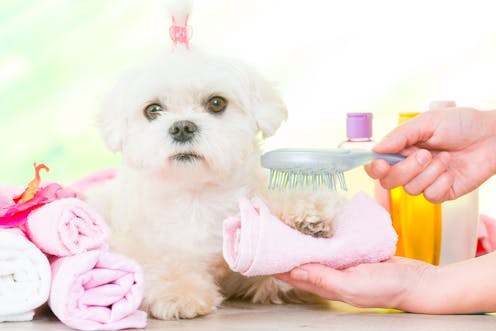
The dog-themed reality show, Pooch Perfect, imposes makeovers on a steady stream of dogs that haven’t asked for them. We may marvel at the skill of professional groomers, but what do the dog models make of all this?
Many dog owners recognise how regular bathing, combing and trimming can provide opportunities to bond with their pets, and to check for parasites, abnormalities and injuries.
Read more: We groom dogs in our own image: the cuter they are, the harder we fall
But beyond simple brushing and combing, the business of bathing, clipping and coat-stripping demands considerably more skill and requires more invasion into the dog’s personal space.
So how do most dogs like being pampered? Short answer: they probably don’t. Let’s explore why.
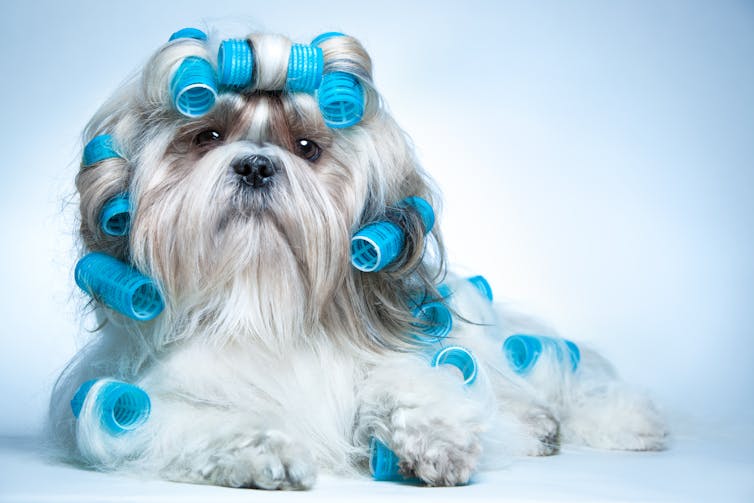 Groomers walk the line between looks and convenience. Shutterstock
Groomers walk the line between looks and convenience. Shutterstock
What grooming trends are practical?
Some owners prefer to keep their dog’s coat in the style and condition traditionally expected for the breed, as set out in breed standards for pure-bred dogs.
Wire-haired breeds, such as some terriers, are traditionally hand-stripped, where loose hair is pulled out by hand or with a stripping knife. Other breeds, such as poodles, have a profuse single-layered curly coat. The breed standard for poodles says: “It is strongly recommended that the traditional lion clip be adhered to.”
For the original working poodles, the lion clip was entirely functional: to allow these retrieving dogs to emerge easily from lakes and rivers without too much waterlogging of their coat. Baubles of hair were retained around the joints, ostensibly to protect them. From that point, the amazing canine equivalent of topiary began.
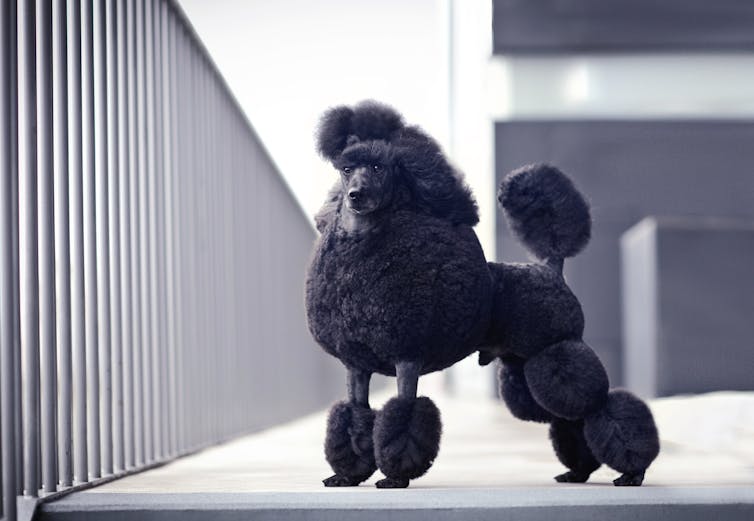 For traditional working poodles, grooming was for functional reasons. Shutterstock
For traditional working poodles, grooming was for functional reasons. Shutterstock
Many dog breeds were developed for working roles, where the hair-coat was purely utilitarian and required little maintenance. However, the recent boom in the popularity of poodle crosses (such as labradoodles and cavoodles) has brought with it an explosion in poodle-like coats among companion dogs.
So, there are now ample opportunities for groomers to walk the line between looks and convenience. These days, dogs’ hair-coat can be teased, back-combed, dyed and sculpted into un-dogly shapes.
Dogmanship: looking like a million bucks
Whether dogs enjoy the experience of being groomed or find it anxiety-inducing depends on how well they were socialised as pups and how thoroughly they’ve been habituated to being groomed.
For the dog, grooming can mean restraint, dousing in water, manipulation of the body, and excessive touching by unfamiliar people as well as painful tugs on the coat if they have knots or matts. And for those dogs who have not had the benefit of gentle familiarisation to grooming and socialisation with unfamiliar humans, this process may be threatening or uncomfortable.
Read more: 8 things we do that really confuse our dogs
This is why the best professional groomers show outstanding so-called dogmanship and handle dogs in ways that settle them and minimise the need for force.
What’s more, dogs are olfactory beings, so they’re unlikely to be happy with the scent of shampoo imposed on them. That said, they may very well feel more comfort when relieved of a heavy coat.
The importance of whiskers
Not all hairs of the dog have the same function. Facial whiskers are exquisite sensors that every dog deserves to keep.
Dogs can be ticklish in parts of their body, such as their hindlegs, but one area of dog’s skin that seems especially sensitive is the muzzle. Canine whiskers (“vibrissae”) are mobile on the muzzle, and each has a network of blood vessels and nerves at its base to amplify vibrations and alert the dog to movement of the exposed part of the hair shaft.
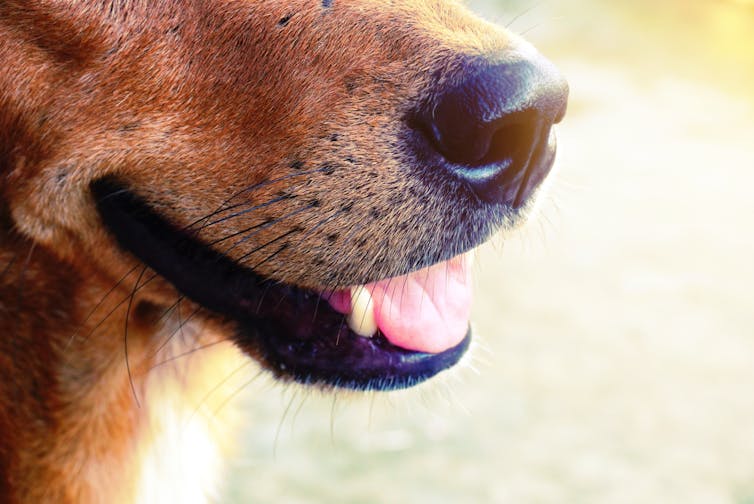 We don’t yet know how clipping whiskers can affect dogs. Shutterstock
We don’t yet know how clipping whiskers can affect dogs. Shutterstock
We can’t say for sure how whiskers help a dog detect the world around its nose. However, we suspect information from these receptors is critical in the play-fighting and wrestling dogs enjoy with familiar companions. And it’s likely that whiskers help dogs to navigate in dim light.
We don’t yet know how we change a dog’s tactile world by clipping their facial whiskers (also known as vibrissal amputation), but it’s worth noting in several countries the removal of the whiskers from horses is illegal due to their critical role in the horse’s spatial awareness. And yet this practice is commonplace for cosmetic purposes in dogs.
Pampered pups are probably confused, not relaxed
Beyond parenting, play-fighting and courtship, dogs dedicate surprisingly little time to physical contact with each other. Professional grooming tasks, such as those featured in Pooch Perfect, are likely to take much longer than the usual social contact dogs get from each other and from humans, and dogs may not understand the purpose of this interaction.
Read more: Let it breed: why desexing dogs isn't always the best thing to do
Signs of apparent cooperation or enjoyment, such as holding still or closing eyes, may actually be the dogs’ attempts to signal peaceful intentions to the groomer by avoiding movements or eye contact that could be interpreted as threatening.
Recognising the possibility that dogs are tolerating, rather than relishing, grooming provides opportunities to address it. Grooming salons should exercise minimal touching and restraint, give dogs regular breaks and ample treats.
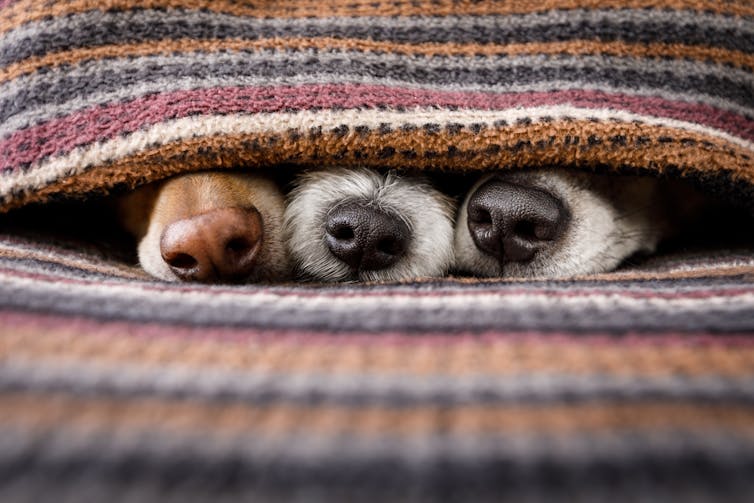 Dogs are olfactory beings, so they’re unlikely to be happy with the scent of shampoo imposed on them. Shutterstock
Dogs are olfactory beings, so they’re unlikely to be happy with the scent of shampoo imposed on them. Shutterstock
Who’s grooming who?
All of this underlines our duty to keep our dogs as comfortable as possible.
Our dogs value the time we spend with them. Preparing puppies to be groomed in later life is important, particularly as combing dogs can reveal health issues that require treating, such as injuries, ticks and tumours.
Read more: Dogs really can chase away loneliness
So while many will admire the skills of groomers, we should all marvel at the dogs’ tolerance of the primates they live with and the interventions they endure.
Authors: Paul McGreevy, Professor of Animal Behaviour and Animal Welfare Science, University of Sydney



















